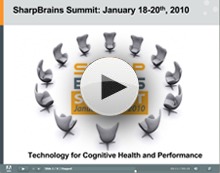About the Summit
This is what some of the participants said:
— “Splendid line-up of speakers.” — Jake Dunagan, Research Director at the Institute For The Future, USA.
— “Universal kudos from our team. Agenda worked out extraordinarily well.” — Ken Kosik, Executive Director of CFIT, USA.
— “One of the best conferences I have ever attended in 4 decades of research & innovation life.” — Ron Baecker, Lab Director at University of Toronto, Canada.
— “Excellent content and outstanding administration.” — Danny Dankner, CEO Applied Cognitive Engineering, Israel.
— “An incredibly stimulating conference, with a perfect balance of science and application.” — David Tal, Owner, A.G.E. Matters Clinic, Canada.
Below are a few selected Transcript Excerpts from the first session “Cognition & Neuroplasticity: The New Health & Wellness Frontier”.
Marian Diamond, UC-Berkeley:
 “I have chosen for my short introduction to our Summit meeting to review our research from 1960 to 2009 providing us with information to maintain a healthy brain…Number one, diet. Number two, exercise. Number three, challenge. Number four, newness. Number five, love.”
“I have chosen for my short introduction to our Summit meeting to review our research from 1960 to 2009 providing us with information to maintain a healthy brain…Number one, diet. Number two, exercise. Number three, challenge. Number four, newness. Number five, love.”
“Third, challenge. People frequently do the same level of crossword puzzles to stimulate their brains year after year. They do not challenge their brains with more difficult levels of puzzles. In our research, we showed that if we challenged the rats to reach their food cups by having to climb over many obstructions, their brains increased more than those of rats who could walk unhindered to their food cups. Challenge increased brain size.”
“Four. Newness. If we keep the same objects for the rats to explore in the enriched cages for several consecutive days, the cerebral cortex appeared not to show a response to the enriched condition. The brain had increased initially but with lack of continued stimulation, had lost the benefit of the input. We found it necessary to change the objects every few days to provide new stimuli to increase cortical dimensions. So newness is important to develop larger brains.” To keep reading…
Tom Warden, Allstate:
 “… we see the opportunity that cognitive training provides as just the next evolution of things that we can advocate and get behind that ultimately make for a better driving experience, a safer driving experience for people. Not only for our insureds, but to help the roads be safer for everyone.”
“… we see the opportunity that cognitive training provides as just the next evolution of things that we can advocate and get behind that ultimately make for a better driving experience, a safer driving experience for people. Not only for our insureds, but to help the roads be safer for everyone.”
“Increasingly, obviously with the baby boom sort of age wave moving through its later years, the safety of senior drivers will become a larger and larger problem that society and companies that insure them will have to face…Then in doing that research we found Posit Science, who is leveraging the useful field of view technology developed by Karlene Ball…so what we did is to attempt to replicate the results that were observed in the laboratory environment where older drivers who have completed a good amount of training, 10 hours or more of training, had shown that the risk of crash could be reduced by up to about 50%.”
“…I believe 8% of the folks that we offered the software to took the software and installed it and about half of those folks actually trained a significant number of hours. And this was done through a direct mail campaign so we didn’t have a lot of integrated marketing of the campaign, so we were pretty happy with the numbers.” To keep reading…
David Whitehouse, OptumHealth Behavioral Solutions:
 “Managed care has not always been on the forefront of innovation and it has been, for us, a challenge and an excitement to think about how best to incorporate the latest findings in neuroscience. If I was to give you the major areas that we think are important, one is the importance of neuroscience capabilitties to improve triage, the second is the importance that this has on increasing access to much better functional assessments and its relationship to safety. The third is in the area of clinical decision support and the fourth is in brain health.”
“Managed care has not always been on the forefront of innovation and it has been, for us, a challenge and an excitement to think about how best to incorporate the latest findings in neuroscience. If I was to give you the major areas that we think are important, one is the importance of neuroscience capabilitties to improve triage, the second is the importance that this has on increasing access to much better functional assessments and its relationship to safety. The third is in the area of clinical decision support and the fourth is in brain health.”
“First and foremost, why is it that in every other organ we have objective data of the organ itself doing its work under various loads to help us when we need to make decisions about its health and disease state and how best to support it and intervene.”
“Much of this has existed in neuroscience. Neuropsychological testing, genetic tests, functional MRI. But in day to day lives of people, these were not easily accessible and were often frequently expensive. The solution to this for us has been a developing relationship with a company in Australia called Brain Resource who have developed what is now the largest standardized integrated neuroscience database in the world on the human brain.”
“As we know, it is 17 years from the bench to clinical practice, and we also know that 50% of guidelines are obsolete within 6 years. For any clinician therefore to keep up to their knowledge base on the level of science that is now coming out and informing clinical decision making is almost impossible without computerized support.” To keep reading…
William Reichman, Baycrest:
 “…there’s an imperative now for those of us in the field of aging to focus more I believe on prevention, wellness, and certainly that science which will help us to best understand how to modify chronic illness risk factors throughout the entire practice of aging, throughout our entire life span.”
“…there’s an imperative now for those of us in the field of aging to focus more I believe on prevention, wellness, and certainly that science which will help us to best understand how to modify chronic illness risk factors throughout the entire practice of aging, throughout our entire life span.”
“This is certainly true not only for physical health but it is true for brain health. I often say, and this was alluded to in the earlier speakers that we must do for brain health in the 21st century what we largely accomplished in cardiovascular health in the past century…that includes an increased focus not only on tertiary prevention, but on primary and secondary prevention.”
“…at Baycrest in the last couple of years, we recognized that it’s now time to take the scientific insights out of the laboratory and to identify practical applications for this science…approximately a year and a half ago the Ontario government made a decision to invest $10 million in Canada’s first centre for brain fitness to be housed at Baycrest at the Rotman Research Institute.”
“Here in Canada I think that we’ve been able to make a compelling case maintaining good brain fitness needs to be a national priority for this country and we have been engaged in discussions with the government, both federally and provincially, that brain health programs really need to begin in childhood.” To keep reading…
P Murali Doraiswamy, Duke University:
 “Virtually in all of the diseases that I work with, whether it be depression, whether it be Alzheimer’s, whether it be ADHD, there are significant limitations to the current treatment modalities and people really want to be free of medication if possible so non-pharmacologic interventions such as exercise, cognitive training, dietary intervention. I think there’s just a huge need for those kinds of interventions.”
“Virtually in all of the diseases that I work with, whether it be depression, whether it be Alzheimer’s, whether it be ADHD, there are significant limitations to the current treatment modalities and people really want to be free of medication if possible so non-pharmacologic interventions such as exercise, cognitive training, dietary intervention. I think there’s just a huge need for those kinds of interventions.”
“… it’s really essential for the field before they really go to the next level to make sure that they occupy a space in people’s minds that associates them with credible science-based claims because you don’t want to walk into a grocery store or into a gas station and see a brain game claiming that they’re a neuroplasticity brain game or a bottle of water that’s claiming it’s a cognitive reserve enhancer because then I think you’re going to destroy the whole field key.”
“So I think it’s essential for academia, for industry, for think tanks, for even the federal government agencies such as perhaps England, US, Canada, to come together and form a set of guidelines that can really guide the proper development of a lot of these products and by products I’m talking about two types of products. One is cognitive screening instruments and the second is intervention products to either improve sort of normal functioning or to increase resilience to stress or three, to prevent disease.”
(answering to audience question, “when do you believe that cognitive screening may become a pretty routine part of standard medical care”) I think it’s long overdue…the brain is the most important organ. To keep reading…
—
About SharpBrains: SharpBrains is a market research firm and think tank devoted to helping organizations, professionals and consumers navigate the brain fitness and cognitive health field. In 2009, the firm released its flagship report The State of the Brain Fitness Software Market 2009, for decision-makers, and the consumer guide The SharpBrains Guide to Brain Fitness, for everyone with a brain. SharpBrains mission is to provide independent, research-based, information and guidance to navigate the growing cognitive and brain fitness market.

